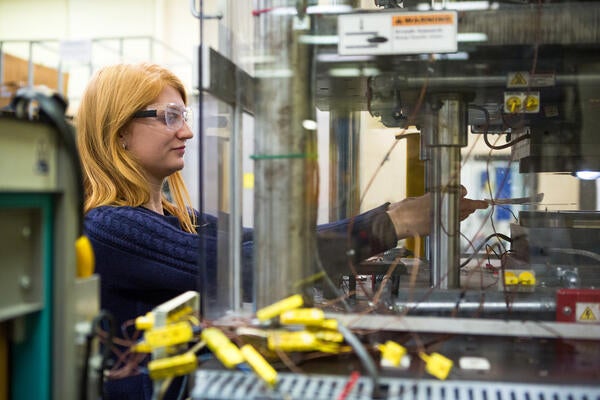
Next-generation electronics: cell phones that roll up like paper
University of Waterloo researchers on the verge of a breakthrough get funding boost from the federal government

University of Waterloo researchers on the verge of a breakthrough get funding boost from the federal government
By Sabrina Hutchison Office of ResearchHany Aziz hopes his research will change the future of electronic devices, making them cheaper and more flexible. His work on new materials can also be applied to solar panels and the future of green energy.
Aziz and his research team at the University of Waterloo are studying organic semiconductors - the next generation of materials that will convert electrical power into light in devices such as laptops and cell phones and harvest light from the sun and convert it into energy in solar cells.

Hany Aziz, professor in the Department of Electrical and Computer Engineering, in his lab at the University of Waterloo
Aziz, a professor in the Department of Electrical and Computer Engineering, hopes his work will mean electronics will be less expensive and users will be able to roll them up and down like a screen. “Understanding and adapting the way light is emitted is critical to the functionality of these new devices,” says Aziz.
Although harvesting light from the sun and converting it into energy isn’t new, using organic material instead of silicon in solar cells is innovative, yet limiting. “Use of organic material decreases reliability and performance over time in solar cells, which isn’t acceptable for practical use,” says Aziz.
Waterloo researchers receive funding boost from NSERC
Aziz will continue to work on these complex issues with the help of a $120,000 Discovery Accelerator Supplement from the Natural Sciences and Engineering Research Council of Canada (NSERC). He and nine other researchers from the University of Waterloo recently received increased funds to support their research deemed to be novel or potentially transformative, and likely to contribute to ground-breaking advances.
The 10 recipients of the Discovery Accelerator Supplement are among more than 100 researchers at Waterloo who have received more than $20 million to further their research through programs such as Discovery grants and grants for equipment.
“This funding provides a valuable boost to researchers entering a critical phase of their work and supports it at the next level. The results will, in turn, advance technology around the world and the Canadian economy,” says D. George Dixon, vice-president, university research at Waterloo.
The other researchers from Waterloo that NSERC selected for supplemental funding in addition to a Discovery grant are:

Read more
The Government of Canada announces funding to support research in food policies and medical devices

Read more
Here are the people and events behind some of this year’s most compelling Waterloo stories

Read more
Research Infosource Inc. recognizes Waterloo’s continued leadership in interdisciplinary research and partnerships to drive impact
The University of Waterloo acknowledges that much of our work takes place on the traditional territory of the Neutral, Anishinaabeg, and Haudenosaunee peoples. Our main campus is situated on the Haldimand Tract, the land granted to the Six Nations that includes six miles on each side of the Grand River. Our active work toward reconciliation takes place across our campuses through research, learning, teaching, and community building, and is co-ordinated within the Office of Indigenous Relations.